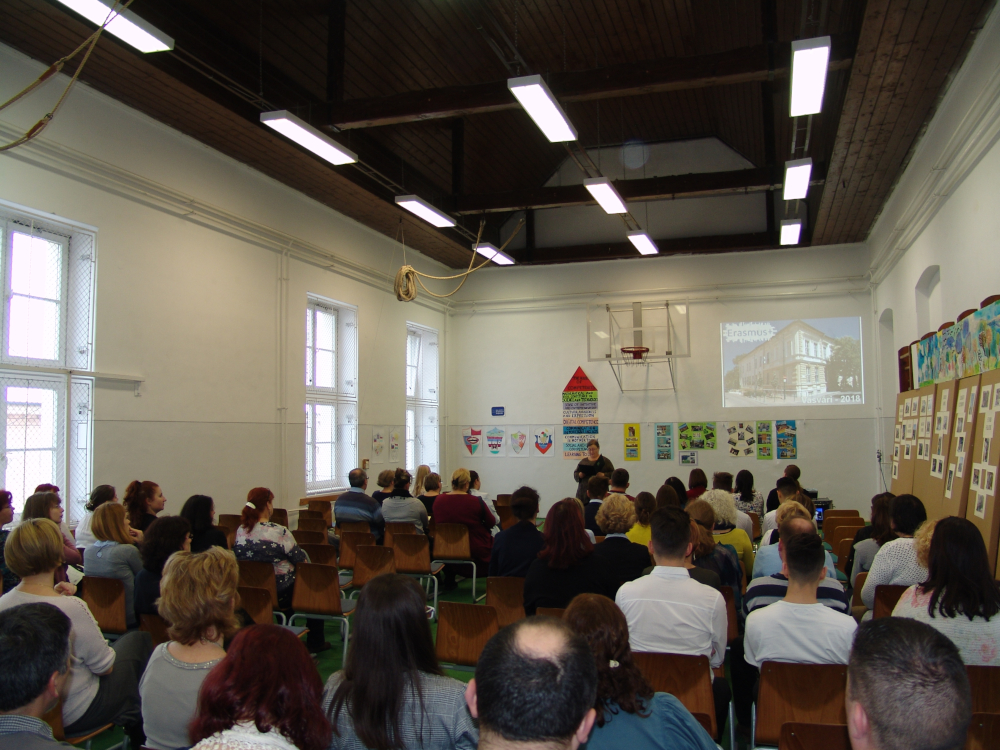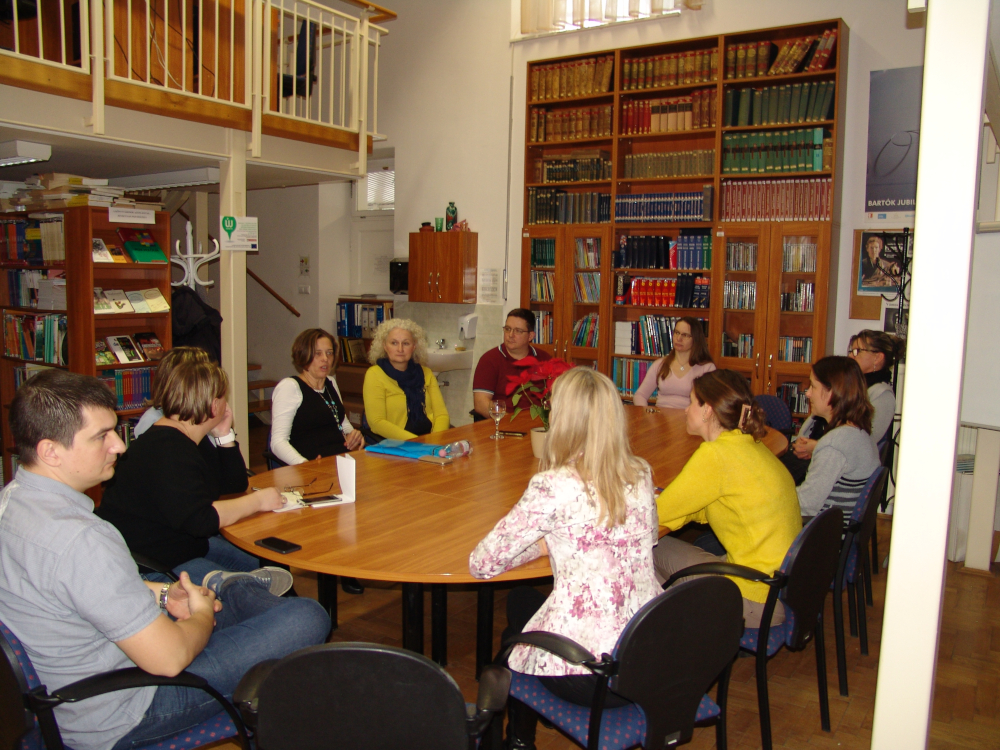
14 teachers from Vasvári Pál Secondary School of Economics and Information Technology of the Vocational Training Centre of Szeged attended professional training courses abroad. Besides developing language and ICT competencies, the Erasmus+ mobility project allowed them to gain new knowledge and learn about best practices. Thus, they can benefit from the best practices of modern teaching methods in their everyday educational work, too, helping the school adapt to the challenges of the 21st. century. We interviewed Project Coordinator Márta Szegfű.
The Power in Teachers' Community - Developing Digital and Language Competencies
| Institution: Vasvári Pál Secondary School of Economics and Information Technology of the Vocational Training Centre of Szeged Project title: Developing Methodological, Digital and Language Competencies in Vasvári Coordinator: Márta Szegfű, Éva Hegyközi Website: http://www.vasvari.hu/nemzetkozi_kapcsolatok |
What were the main goals of the project and how were they specified? Was there an actual issue that needed a solution?
The situation and opportunities of our school provided the starting point. We had a number of new ICT tools and we'd completed some school level developments, but we felt that these were only incidentally integrated into our academic work and that they required a new approach and new methodology. Where we saw a solution was looking for courses focusing on digital and modern methodological knowledge, which, fortunately, raised the interest of many colleagues. The language education of our staff members have a similar purpose, since the language of business and IT is English, and therefore their linguistic improvement also supports the integration of modern competencies into classroom work.
How did the course organisers and host institutions involved support the implementation of the project goals?
We looked for courses and training institutions which suited the project goals. The host institutions did not only contribute to the success with the courses itself, but also with their international atmosphere and their modern approach. The project helped us establish professional relationships which we can as well build on in the future.
Who were the participants of the mobility activities? Who did the project team consist of?
At the beginning, our colleagues needed some encouragement, so transferring the information accurately was essential. Then, the potential participants looked for courses on their own, too, and they also discussed the interesting opportunities among each other. Through the composition of the team involved in mobility activities, we tried to cover the entire organisational structure of the school: the 14 participants represented the school management, as well the IT, the economics and the foreign languages teams. The 10 foreign language teachers mostly attended courses focusing on digital and methodological competencies, whereas the 4 teachers of general subjects attended language courses.
What courses helped the development of teachers' competencies? Which areas showed the greatest changes and improvement?
We were very lucky with the training institutions, because they all ensured high professional standards and a positive, motivating atmosphere to learn in, without exception. The improvement of our colleagues' digital and methodological competencies was especially evident, and I'd also like to emphasise that they returned home stronger, since they all managed in an international professional environment.
How did you integrate the experience and knowledge gained into the everyday life of the school? What are the long-term impacts of the project?
On the one hand, the use of applications, websites and information learnt during the mobility has become common, since they can be shared very easily, not only within the team, but also with the entire teaching staff. We have, for example, created two task collections for this purpose. On the other hand, our colleagues' motivation to use the new opportunities in classes and share them with each other has clearly increased. Technical issues are easier to solve if you can choose from a number of familiar methods and options. The long-term impact of the project is a constantly renewing professional and methodological knowledge, which also the students and the parents can perceive.
What steps have you taken in terms of internationalisation?
Formerly, our school hadn't been involved in any Erasmus+ projects addressing the staff. We gained a lot of international experience during our first project, and we established professional relationships which our school can also benefit from in the future. Now it's not only the language teachers who are interested in such opportunities of professional development.
One of the greatest achievements of the project is that the individual phases of implementation are built on each other. How did you plan the project schedule, what were the difficulties of keeping it and what helped you overcome them?
The schedule was planned by the project leading coordinators, and it was finalised in agreement with the school management. Each participant was familiar with the plan thus prepared, and everyone did their share of the duties; also, we made changes flexibly when they were needed in order to adapt to any current school needs.
Another outstanding value of the project is that our colleagues gave detailed reports of their experiences. How can you motivate 14 people to share their experiences in such a disciplined manner, paying attention to every detail?
One of the greatest values of Vasvári is cooperation, the power in the community of teachers. As a coordinator, I would say that what is important is a well-conceived schedule, and the continuous communication between the project coordinators and the participants. We discussed what information the reports should contain, so the participants were aware of the deadlines for completing each task. We did all that helping each other. We didn't really need motivation, because the reports were written directly after returning home, so the experiences gained abroad were still very fresh and vivid in everyone.
The value of the project is greatly enhanced by the fact that its dissemination activities were broadly expanded to include the direct partners of the school (students, parents), as well as beyond the limits of the institution (dissemination day, Facebook, project website, open day). Did you also have a detailed schedule or strategy for this?
The goal of our dissemination strategy was to present the school's first Erasmus+ project in as many places and ways as possible. Of course, we also had a schedule for that, but the best practices helped us, too, as many schools of the Vocational Training Centre of Szeged are experienced Erasmus+ implementers - we had seen them implement similar activities. We were mostly driven by our enthusiasm to be able to present our achievements as broadly as possible.
What dissemination tips would you give to other projects, and what would you recommend them to pay attention to or lay emphasis on within this field?
I would advise them to involve their students and colleagues in various ways - through giving accounts of their experiences, or during Erasmus Days, presentations or workshops. Another thing that worked very well with us was integrating dissemination into the school's traditional, scheduled programmes. Since these programmes also address various target groups besides students, we had a number of dissemination options: schooling programme series for 8th graders, open days for primary school students and their parents, parent-teacher meetings, municipal level Vasvári Day events, centre level dissemination day with professional workshops for colleagues and leaders. We found that, beyond spreading our project outcomes, dissemination was also a great opportunity to exchange further experiences and build relations, so we suggest that you should lay great emphasis on it, too, and allocate an appropriate amount of the organisational budget to it.
|
PROJECT VALUES They have achieved outstanding learning outcomes, which has a short as well as a long-term impact on the school's work. The teachers involved in the mobility activities use the newly learnt methods, applications and computer programmes in their classes, and share them with each other, the members of their work team and the teaching staff in methodology training sessions and workshops. |
Utolsó módosítás: 2020.07.27.














